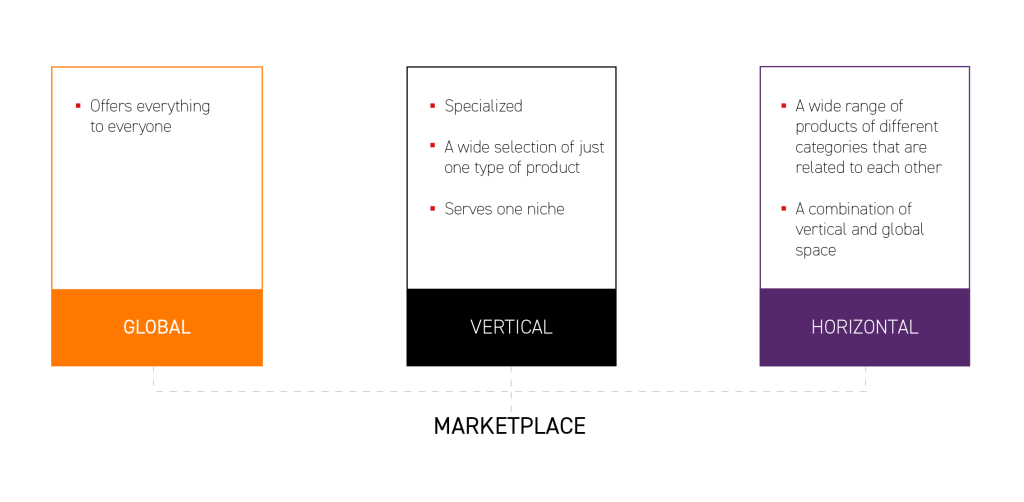How Are Marketplace Platforms Changing Traditional B2B Trade?
Digital technologies such as the Internet of Things (IoT), artificial intelligence (AI) and solutions based on data analytics have greatly accelerated the transformation of B2B commerce. They have enabled more sophisticated and efficient operations in a sector that traditionally relied on business-to-business relationships, multiple intermediaries and often complex and time-consuming procedures. At the same time, companies are constantly looking for opportunities to gain a competitive edge and reach new customer groups. A tempting prospect is to open new sales channels and expand overseas.
In times of cost optimization, all such activities must, first and foremost, be cost-effective, so it is increasingly popular to start selling on marketplace platforms. Both companies that are taking their first steps in online sales and companies that are active online, but want to expand into new markets, are opting for this.
Marketplaces as an Innovative Tool in B2B Trade
A B2B marketplace can be defined as an online platform that enables companies to sell, buy and exchange products or services within a business ecosystem. Their history dates back to the 1990s, but they have evolved significantly since then. One example is Amazon Business, which has become a global leader in the B2B marketplace segment, with 36% of business buyers using the platform. Ebay was in second place, with a popularity of 30%, while 27% buy on the Chinese marketplace Alibaba.
Features of B2B marketplaces include an extensive database of suppliers and buyers, automation of sales processes, personalization of offers and recommendations, and integrations with ERP (Enterprise Resource Planning) and CRM (Customer Relationship Management) systems. All this contributes to increased accessibility to global markets, purchasing process optimization, operational efficiency, and data analysis.

Marketplace Platforms as an Agent of Digital Transformation in B2B Trade
B2B marketplace platforms are not only streamlining traditional business models, but also accelerating the digital transformation of companies. Companies using these platforms are forced to streamline their processes and technology infrastructure, helping to adapt more effectively to changing customer needs.
Likewise, B2B customers expect convenient and personalized shopping experiences, and marketplaces provide the tools to meet those needs.
Easier Access to Deals and Suppliers
B2B marketplaces operate as an online platform where companies can showcase their products or services. This gives companies much easier access to a variety of offers and suppliers. They no longer have to rely on traditional catalogs or intermediaries. All they need to do is log on to the platform to find a wide selection of products and services.

Optimization of Purchasing Processes
The traditional B2B purchasing process can be lengthy and costly. Marketplace platforms allow companies to optimize these processes by automating many activities, such as price comparison, negotiation and ordering. This translates into time and resource savings.
Expanding the Scope of Operations
Starting to sell on a marketplace platform enables companies to expand into global markets with relative ease and at low cost. Companies can easily establish contacts and do business with foreign partners, significantly increasing growth potential.
For entrepreneurs, marketplace platforms can also be a way to test a new business model involving D2C (direct-to-consumer) sales, i.e. directly to end customers. The Alpinus brand, for example, has opted for such a solution, using Decathlon’s marketplace.
Adapting to Digital Trends
In an era of increased competitiveness and a digital race, B2B companies need to be flexible and adapt to changing trends. Marketplace platforms offer the convenience of shopping and are intuitive and modern, which is attracting younger generations of entrepreneurs proficient in navigating the digital landscape.
Data Analysis and Personalization
Personalization is not just a trend, but a must have in retail operations, including in the B2B sector. Marketplace platforms collect huge amounts of data on transactions and customer behavior. This allows companies to accurately analyze their target markets, extract valuable customer information and customize their marketing strategies and offers.

Competitiveness and Innovation
Competition on marketplace platforms is driving companies to strive for innovation, improving their products and services. As a result, the B2B marketplace is becoming more competitive, which translates into benefits for customers in the form of better prices and quality.
Challenges and Barriers to Implementing B2B Marketplaces
Despite the numerous benefits, using B2B marketplaces comes with some challenges. Data and transaction security is a top priority, so appropriate data protection solutions are necessary. In addition, regulations can vary by region, which poses challenges for companies operating globally.
Implementing a marketplace also requires adapting business processes to the new online reality, which can be time-consuming and costly. Changing the mindset of employees and adapting the entire organization to the new technology is also a key challenge.
Data and Transaction Security
Data security is one of the most important challenges in the context of B2B marketplaces. Companies store sensitive financial information, customer data, and product data on these platforms. Hacking attacks, data leaks or theft are just some of the risky situations that can occur.

Regulations
Regulations and laws governing B2B commerce can be complex and vary by region or industry. Companies that operate globally must carefully monitor and comply with these regulations, which can generate costs and be time-consuming. This also means that businesses must constantly keep their finger on the pulse of regulatory changes and adjust their operations in response.
The Need to Adjust Business Processes
Implementing a B2B marketplace may require a fundamental change in business processes. Therefore, it is important for a company to be ready to adapt its organization to the new online reality. This often involves training employees and changing procedures, as well as investing in technology and systems that will enable effective integration with the marketplace platform. A technology partner can be a great support in this process, sharing its knowledge and experience, guiding the company not only through the implementation process, but also preparing for the changes and subsequent maintenance of the solution.

Challenges for Employees
The transition to online platforms can be difficult for employees who are used to traditional business processes. It is necessary to educate and convince the team of the benefits of implementing a marketplace. Many companies also need to adapt their organizational culture to a more flexible and innovative approach to B2B commerce.
Competition in the Marketplace Market
The B2B marketplace market is increasingly competitive. Companies must compete not only with traditional competitors, but also with other suppliers on the platform. This means that it is necessary to develop a unique offering, both in terms of products and customer experience.
Technical Issues and Integrations
Integrating the marketplace platform with existing ERP, CRM and other tools is a key aspect of success. Companies need to find the right technology solutions and ensure seamless data synchronization to avoid problems with errors or process delays. See how Polish furniture manufacturers Black Red White solved this with our support.

Growth and Scalability
As a company grows, there may be a need to adapt and scale the marketplace platform. It is necessary to constantly monitor performance, adapt to changing customer needs and make improvements to meet growing market demands.
The Future of Marketplaces in B2B Commerce
Trends and forecasts point to further development of these platforms, including an expansion of service offerings and integrations with new technological solutions. Artificial intelligence (AI) will play an increasingly important role in analyzing data and generating recommendations, which will streamline purchasing processes. Marketplace platforms will create business ecosystems in which suppliers, buyers and other companies will collaborate, increasing the value and attractiveness of these platforms. B2B marketplace platforms have the potential to revolutionize global trade, enabling companies to access new markets, partners and customers around the world.
Summary
B2B marketplaces are playing a key role in the digital transformation of B2B commerce. They allow companies to achieve new levels of efficiency, competitiveness and adaptation to changing customer needs. Despite the challenges of their implementation, the prospects for the future seem more than promising, especially if marketplaces are viewed as one of the stages of a company’s growth in the competitive B2B marketplace.








